

Not Taking Bad Advice: a Pedagogical Model. The text for my flipped keynote at Digital Pedagogy Lab 2020.
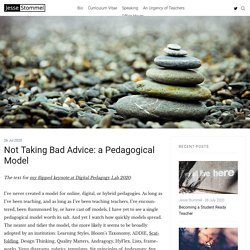
I’ve never created a model for online, digital, or hybrid pedagogies. As long as I’ve been teaching, and as long as I’ve been teaching teachers, I’ve encountered, been flummoxed by, or have cast off models. I have yet to see a single pedagogical model worth its salt. The Invented History of 'The Factory Model of Education' 12 min read “What do I mean when I talk about transformational productivity reforms that can also boost student outcomes?
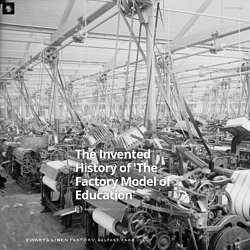
Our K–12 system largely still adheres to the century-old, industrial-age factory model of education. A century ago, maybe it made sense to adopt seat-time requirements for graduation and pay teachers based on their educational credentials and seniority. Educators were right to fear the large class sizes that prevailed in many schools. COVID-19 as a catalyst for educational change. Many areas of schooling in educational institutions can be and should be rethought.
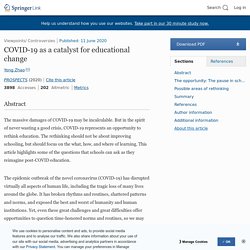
Roughly speaking, all education has to do with three areas of learning: what, how, and where. Learning from whom and when learning should take place are also important, but they can be discussed with the other three areas. What? The “what” of learning has always been the curriculum prescribed by government agencies or bodies of authoritative individuals. Schools are typically the entities that implement an existing curriculum, make sure that students are exposed to and master the curriculum, and report that their students have done so to parents, colleges, the public, and whoever else wishes to know. The practice of applying the same content for all students has been challenged for a long time, for two main reasons. Instead of continuing to force all students to study the same content, schools can invite their teachers to ask new questions. Interested in unpacking the Education Reimagined: The Future of Learning paper? Join June 18 at 4PM EST to work through the content and the tools. Register @NewPedagogies.
How to Design for Learning: Four Approaches to Nonlinear Curriculum. Is school designed for the way humans learn?
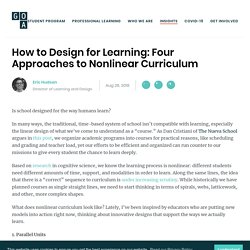
In many ways, the traditional, time-based system of school isn’t compatible with learning, especially the linear design of what we’ve come to understand as a “course.” As Dan Cristiani of The Nueva School argues in this post, we organize academic programs into courses for practical reasons, like scheduling and grading and teacher load, yet our efforts to be efficient and organized can run counter to our missions to give every student the chance to learn deeply.
Based on research in cognitive science, we know the learning process is nonlinear: different students need different amounts of time, support, and modalities in order to learn. Along the same lines, the idea that there is a “correct” sequence to curriculum is under increasing scrutiny. Moodle. When groups of high schoolers arrive at Carnegie Mellon University’s Entertainment Technology Center (ETC), they’re greeted by a life-sized statue of the Incredible Hulk.
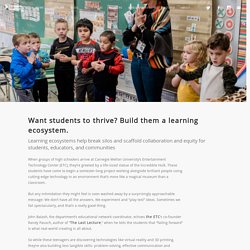
These students have come to begin a semester-long project working alongside brilliant people using cutting-edge technology in an environment that’s more like a magical museum than a classroom. But any intimidation they might feel is soon washed away by a surprisingly approachable message: We don’t have all the answers. We experiment and “play test” ideas. Sometimes we fail spectacularly, and that’s a really good thing. John Balash, the department’s educational network coordinator, echoes the ETC‘s co-founder Randy Pausch, author of “The Last Lecture,” when he tells the students that “failing forward” is what real-world creating is all about.
These student-guided projects at CMU are just one example of the collaboration that can happen in the Pittsburgh region through the ever-growing Remake Learning network. 9789264174559 4 en. Constructing 21st Century Tchr Ed. (45) Constructing 21st Century Teacher Education. Innovation in teacher education: Collective creativity in the development of a teacher education internship. Teaching Critical Thinking Skills to Kindergarteners. I’ve argued elsewhere that yes, we can define, teach, and assess critical thinking skills, but I know what you are probably thinking.
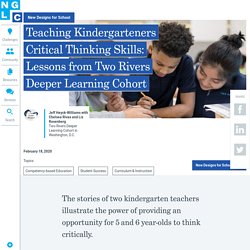
These skills are all good for middle and high school students and maybe upper elementary kids, but kindergarteners? However, I was in a kindergarten class recently where five and six year-olds were making evidenced-based claims and critiquing the arguments of each other. Kindergarteners were thinking critically! Two Rivers Public Charter School in Washington, D.C., is wrapping up our second Deeper Learning Cohort.
Twenty-four educators from schools across the city participated to learn how to deepen their students’ thinking through the use of thinking routines with aligned rubrics and performance assessments. This group of dedicated teachers from prekindergarten through 8th grade gathered at convenings over the course of this past school year to explore what it means to help students think more deeply about what they are learning. Teaching Critical Thinking Skills to Kindergarteners. Rukmini Banerji Address. Louka Parry sur Twitter : "15000 views! Thanks to everyone whose watched and shared my little @TEDx talk - Words Can Change the World: How #langauge #learning deepens #connection. I'm so passionate about global citizenship for empa.
Aprendizaje modular y apilable: qué significa y por qué transformará el aprendizaje en el lugar de trabajo. Posted in: En Español Recientemente hice mis predicciones sobre cómo cambiarán el aprendizaje y el trabajo en 2020.
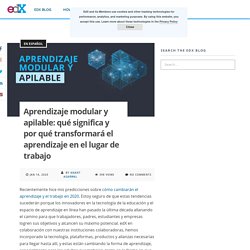
Estoy seguro de que estas tendencias sucederán porque los innovadores en la tecnología de la educación y el espacio de aprendizaje en línea han pasado la última década allanando el camino para que trabajadores, padres, estudiantes y empresas logren sus objetivos y alcancen su máximo potencial. edX en colaboración con nuestras instituciones colaboradoras, hemos incorporado la tecnología, plataformas, productos y alianzas necesarias para llegar hasta allí, y estas están cambiando la forma de aprendizaje, especialmente para los adultos que trabajan, tanto en la forma en que el contenido es consumido como en la forma en que es entregado.
Curriculum version basada en darwin.